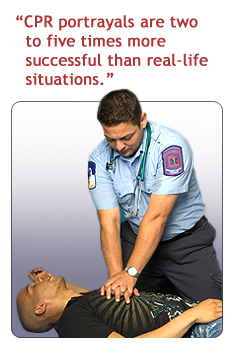 A young woman suddenly convulses, writhing on the floor. Within seconds, the ER personnel -- actually actors portraying emergency room employees -- step in with professional efficiency and hold the patient down firmly, sticking a tongue depressor in her mouth.
Of course, this is fiction but it is a popular hit show that realistically portrays slice-of-medical-life health crises. So it is most likely depicting an accurate look at how to help a seizure patient, right?
Wrong.
Researchers who have analyzed popular TV shows like "Grey's Anatomy" and "House," (both in their sixth season on-air) have come up with a prescription for those who watch doctor dramas: don't swallow everything you see as medically accurate. In particular, first aid techniques portrayed on these shows are not necessarily right or even safe. In fact, some of the info, like the appropriate way to treat a seizure in progress, can be downright dangerous.
Sizing up seizure advice According to the National Institute of Neurological Diseases and Stroke, epilepsy is a brain disorder in which clusters of nerve cells, or neurons, sometimes misfire, causing seizures. Seizures can also be caused by high fevers, brain injury or anything that disturbs the normal pattern of neuron activity.
The Epilepsy Foundation notes that epilepsy and seizures affect about 3 million Americans of all ages, so it's not unexpected that this fairly common disorder would wind up in the plots of medical dramas. And it has -- "Grey's Anatomy," "House," "Private Practice" and "ER" have all featured episodes with people having seizures.
In fact, a study presented at the American Academy of Neurology's annual meeting held in Toronto last month found that 59 seizures occurred in 327 episodes of these shows. Almost all were shown taking place in a hospital and first aid was performed by "nurses" or "doctors" who, over half the time, delivered emergency care that was inappropriate -- including holding the person down, trying to stop involuntary movements or putting something in the person's mouth.
So does fiction that gets medical facts wrong really do any harm? Researcher Andrew Moeller of Dalhousie University in Nova Scotia, Canada, who headed the study, thinks the answer is "yes".
"Television dramas are a potentially powerful method of educating the public about first aid and seizures," Dr. Moeller says. "Our results, showing that television shows inaccurately showed seizure management half the time, are a call to action. People with epilepsy should lobby the television industry to adhere to guidelines for first aid management of seizures."
If you witness a person having a convulsion type seizure, don't try to remember what the cast did on "House" or "ER". Instead use these basic first aid tips from the National institutes of Health:
- Do not attempt to force an object (such as a spoon or a tongue depressor) between the teeth.
- Do not try to hold the person down during the seizure.
- Turn the person to the side if vomiting occurs. Keep the person on his or her side after the seizure is over if the person is sleeping.
- CPR or mouth-to-mouth breathing is rarely needed after seizures and cannot be performed during the seizure.
- If a person has repeated or prolonged seizures without regaining consciousness or returning to normal behavior, the body may develop a severe lack of oxygen. Call 911.
CPR myths No one expects to learn cardiopulmonary resuscitation (CPR) from TV shows -- but it turns out you shouldn't assume the results of the rescue technique are what you see on medical dramas, either.
When Duke University researchers studied almost 100 episodes of a variety of doctor-themed programs, including "ER", they found CPR portrayals were two to five times more successful than real-life situations. And that could create false and potentially dangerous impressions about the risks and benefits of this rescue technique. In real life, most people receiving CPR are elderly or hospitalized and have heart disease, cancer or other chronic conditions. Many who survive the initial resuscitation die soon afterwards or suffer permanent neurological damage caused by their disease or the rescue effort itself. But according to the Duke research, TV shows imply CPR is mostly used for emergency roadside rescues, primarily on overwhelmingly young victims of gunshot wounds, car wrecks or similar traumatic injuries.
What's more, the study found that in the fictional world of doctor dramas patients either fully recovered or immediately died after CPR. The third possibility -- long-term or permanent disability caused by their disease or the CPR itself -- was virtually ignored. The researchers point out that by avoiding portrayals of the suffering, neurological damage, or death that may follow the use of CPR, medical show plots are skirting serious ethical issues. That doesn't mean CPR doesn't save lives or isn't an important first aid technique to learn. According to the American Heart Association, about 80 percent of all out-of-hospital cardiac arrests occur in private residential settings, so being trained to perform CPR can mean the difference between life and death for someone you know.
Effective CPR performed immediately after cardiac arrest doubles a person's chance of surviving. However, the reality is that approximately 95 percent of sudden cardiac arrest victims die before they reach the hospital -- unless they are characters on a fictional television show.
"In hospitals across the country, patients and physicians struggle with end-of-life decisions that involve whether or not to attempt CPR and other life-sustaining measures," said Dr. Susan Diem, a researcher at the Durham VA Medical Center and lead author of the study. "In subtle but powerful ways, the misrepresentation of CPR on television shows undermines trust in scientific data. Because they appear realistic in many respects, these shows blur the line between fact and fiction."
Want training and real facts, not fiction, about CPR? Check out these links to find courses in your area:
|